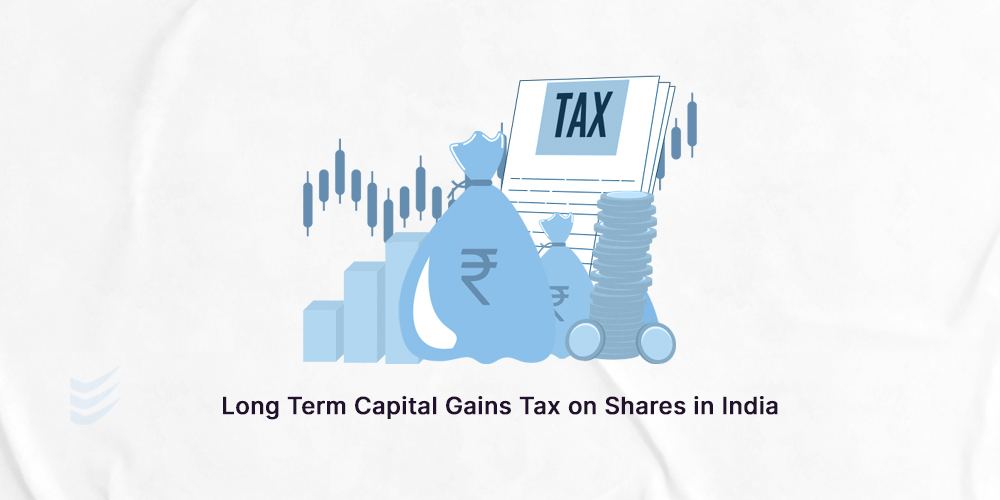Long-Term Capital Gains Tax on Shares in India: Exploring LTCG Calculation Methods

Introduction
Imagine you invested in a company's stock a few years ago and held onto it for more than one year. Over that time, the company experienced significant growth, leading to a substantial increase in its stock price. Eventually, you decide to sell the shares and realize a profit from the sale. Since you held the shares for more than one year, any profit you made on the sale would be classified as Long-Term Capital Gains (LTCG) in the stock market. Understanding how long term capital gain tax on shares operates is crucial because it can impact your tax liabilities and overall investment strategy.
Now, let's delve deeper into the realm of long-term capital gain tax on shares, including how to calculate LTCG on shares and other related aspects.
What are Long-Term Capital Gains?
Long-Term Capital Gains (LTCG) on shares denote the profit accrued from selling shares held for over a year. It's a crucial concept as it impacts tax obligations. Generally, LTCG incurs lower tax rates compared to short-term capital gains tax (STCG) on shares, which applies to assets held for less than a year. This means holding shares for over a year before selling them might subject investors to a reduced long term stock gain tax rate on any resulting profits.
Long-Term Capital Gains Tax on Shares in India: 2025
January 2025:
The new Long-Term Capital Gains (LTCG) taxation regime, which came into effect from January 1, 2025, made some changes. The LTCG tax rate rose to 12.5% compared to the earlier 10% on listed shares. The exemption threshold was increased to Rs.1.25 lakh, enabling investors to treat a larger share of their capital gains as exempt. Further, the period for qualifying as LTCG was explained more specifically: one year for listed stocks and two years for unlisted assets. These were the changes that raised fears among investors regarding increased tax liabilities on long-term investment.
February 2025
After the budget announcement, markets witnessed volatility, with Sensex dipping more than 800 points because of investor fear regarding the increased LTCG tax. Investors diverted their attention towards tax-saving tools, including mutual funds and tax-free bonds, in order to reduce the burden of the new tax rates. The change in investment strategy caused higher demand for tax-efficient financial products, as traders readjusted their portfolios because of the changes.
March 2025:
By March, markets were stabilizing as investors transitioned to the new LTCG tax regime. Speculations of additional tax changes in the upcoming Income Tax Bill 2025 were present, but no major changes to LTCG tax were anticipated for the year. The market was adjusting, and investors were concentrating on maximizing their portfolios through tax-favourable investments.
What is the Long-Term Capital Gains Tax Rate for Shares?
Capital gain on long term shares are taxed differently by the Indian government compared to Short-Term Capital Gains (STCG) on shares. LTCG refers to the profit earned from selling shares held for over one year.
The long-term capital gain on shares is taxed at a flat rate of 20%, with the benefit of indexation. Indexation adjusts the purchase price of the shares for inflation, meaning that the tax is imposed on the inflation-adjusted gain rather than the nominal gain. However, it's important to note that the benefit of indexation is only applicable to debt-oriented mutual funds and not to equity-oriented mutual funds or shares.
LTCG Example
Let’s imagine you purchased shares in a company for Rs. 300,000 in September 2018 and sold them in December 2023 for Rs. 600,000. This results in a profit of Rs. 300,000 from the share sale. Assuming you held the shares for more than one year, tax authorities would classify this profit as a long-term capital gain on shares. You can utilize the benefit of indexation to adjust the purchase price for inflation. Suppose the inflation rate during this period is 7%, the indexed cost of acquisition would be Rs. 391,608. Subsequently, the taxable LTCG would amount to Rs. 208,392 (Rs. 600,000 – Rs. 391,608), with the long term capital gain tax on shares totaling Rs. 41,678 (20% of Rs. 208,392).
Changes to Long-Term Capital Gains Tax Provisions
In the 2018 Budget, the Income Tax Act of 1961 underwent a significant amendment with the removal of Section 10 (38). This modification eliminated the exemption on long-term capital gains on equity shares and equity-oriented mutual funds. The unique original section, established in 2004 by the Kelkar Committee, was designed to incentivize investments from Foreign Institutional Investors (FIIs).
Following the 2018 Budget, Section 10 (38) was replaced by a new provision, Section 112A, which delineates the taxation of capital gains from specific assets such as:
-
Equity Shares
-
Equity Funds and their Units.
-
Business Trusts and their units.
How to Compute Long-Term Capital Gain on Shares?
The method for calculating LTCG on shares is as follows:
The applicable long term capital gain tax on shares will be determined according to the current tax laws in the respective country after calculating the LTCG
|
LTCG = Sale Price of Shares – (Cost of Acquisition + Cost of Improvement + Transfer Expenses + Other Incidental Charges) Where, |
The applicable long term capital gain tax on shares will be determined according to the current tax laws in the respective country after calculating the LTCG.
Income Tax on LTCG on Shares
In India, long term capital gain tax on shares and equity-oriented mutual funds is levied at a rate of 10% (plus surcharge and cess) if the gains exceed Rs. 1 lakh in a fiscal year. LTCG is applicable to profits earned from the sale of shares or equity-oriented mutual funds held for more than one year.
For securities not covered by Section 112A, different tax rates apply. The table below illustrates the tax implications for long term capital gain tax on shares for various securities:
|
Particulars |
Applicable Tax Clause |
|
Sale of Listed Shares and Mutual Funds on Recognized Exchanges with STT Payment |
10% tax for gains exceeding Rs. 1 Lakh. |
|
Sale of Bonds, Debentures, Shares, and Listed Securities Exempt from STT Payment |
10% |
|
Sale of debt-oriented Mutual Funds |
With indexation – 20% Without indexation – 10% |
Grandfathering on LTCG Tax - Section 112A
The Finance Act of 2018 introduced revisions to the Income Tax Act, which included exemptions and relaxations applicable from the assessment year 2019-2020. With these alterations, both listed and unlisted equity shares, along with equity-oriented funds, now attract a 10% tax rate on long-term capital gains, with an exemption provided for LTCG up to Rs 1 lakh. To be eligible for the 10% long term capital gain tax rate on shares, taxpayers are required to meet specific conditions:
-
They must pay Securities Transaction Tax (STT) when purchasing and selling shares.
-
They must also pay STT when disposing of equity-oriented mutual fund units.
To address the tax treatment of shares, the implementation of forward-looking tax clauses is crucial, effective from the date of the imposition of LTCG under Section 112A.To accomplish this, the Income Tax Department implemented grandfathering clauses. These clauses ascertain the cost of acquisition based on the Fair Market Value (FMV).
For shares acquired before February 1, 2018, the cost of acquisition is calculated as the higher of the actual purchase cost or the Fair Market Value (FMV) of the shares as of January 31, 2018, or the actual sales price upon transfer, whichever is lower.
Example of Calculating Long-Term Capital Gains on the Sale of Shares
Let's consider a different scenario for calculating long term capital gain tax on shares.
Suppose an investor purchased 800 shares of XYZ Ltd. at Rs. 150 per share on June 1, 2018, and sold them on August 31, 2022, at Rs. 400 per share. Assume that Securities Transaction Tax (STT) was paid for both the purchase and sale of shares.
Since the investor held the shares for more than 24 months, the capital gains on the sale of shares will be treated as long-term capital gains. The long term capital gain tax on shares rate on the sale of listed equity shares is 10%, and the cost inflation index (CII) for the financial year 2018-19 was 280, and for the financial year 2022-23, it was 340.
Here's how to compute the long term capital gain tax on shares:
Sale Price = Rs. 400 per share x 800 shares = Rs. 3,20,000
Purchase Price = Rs. 150 per share x 800 shares = Rs. 1,20,000
Indexed Purchase Price = Rs. 1,20,000 x (340/280) = Rs. 1,45,714.29 (rounded off to Rs. 1,45,714)
LTCG = Rs. 3,20,000 – Rs. 1,45,714 = Rs. 1,74,286
LTCG Tax = Rs. 1,74,286 x 10% = Rs. 17,428.60 (rounded off to Rs. 17,429)
Therefore, the investor will be required to pay Rs. 17,429 as long term capital gain tax on shares on the sale of shares.
How to Minimize Capital Gains Tax Liability?
Reducing the tax burden on capital gains in India is a critical consideration for investors aiming to optimize their returns. Specifically, the long term capital gain tax on shares can significantly impact an investor’s profits, underscoring the importance of exploring available tax-saving strategies.
Tax Loss Harvesting
One approach to mitigating long term capital gain tax on shares is to leverage tax-saving mechanisms like tax loss harvesting. This strategy involves selling underperforming investments to offset gains from successful ones. Such a practice can effectively lower the overall tax liability by balancing gains and losses against each other.
For instance, if an investor realizes a capital gain of Rs. 15,000 from one stock sale but incurs a capital loss of Rs. 7,000 from another, the net capital gain would amount to Rs. 8,000, subjecting only this amount to LTCG tax.
Indexation
Another avenue to lessen long term capital gain tax on shares is by utilizing indexation. Indexation entails adjusting the purchase price of an asset to account for inflation, thereby reducing the taxable gains. This strategy is particularly pertinent for long-term investments, as it counteracts the eroding effect of inflation on asset value.
For example, if an investor bought a stock for Rs. 1,50,000 in 2012 and sold it in 2024 for Rs. 3,00,000, the actual gain isn't Rs. 1,50,000 but is adjusted to reflect inflation during this period. Employing indexation lowers the taxable gain, consequently reducing the liability on Long term capital gain tax on shares.
Other Tax-Saving Strategies
Additional options for mitigating LTCG on stocks include investing in tax-saving vehicles such as Equity Linked Savings Schemes (ELSS), National Pension Scheme (NPS), and Unit Linked Insurance Plan (ULIP), among others. These investment avenues offer tax benefits under Section 80C of the Income Tax Act, thereby lowering the overall tax liability.
Reporting Long-Term Capital Gains (LTCG) in ITR Filing
The Central Board of Direct Taxes has made updates to the ITR-2 and ITR-3 forms, which are summarized below:
-
Individuals and Hindu Undivided Families (HUFs) who have long-term capital gains from shares are required to report them in Section B7 of ITR-2, unless they are classified as "Income from Business or Profession."
-
Non-residents who have LTCGs from share transactions should disclose them in Section B7 (ITR-2) and B8 (ITR-3).
-
If equity shares are treated as stock-in-trade, the profits are categorized under "Income from Business and Profession," and they are exempt from the 10% long term capital gain tax on shares, even if they exceed Rs. 1 lakh.
Exceptions to Long-Term Capital Gain Tax on Shares
In general, long term capital gain tax on shares applies to profits obtained from selling shares held for over 12 months. However, there are specific exemptions to this rule, which include:
-
Listed Equity Shares: Long term capital gain tax on shares resulting from the sale of listed equity shares on a recognized stock exchange are exempt from tax, provided Securities Transaction Tax (STT) has been paid during the sale transaction.
-
Equity-Oriented Mutual Funds: Long-term capital gains from the sale of equity-oriented mutual funds are exempt from tax, provided STT has been paid during the sale transaction.
-
Start-up Shares: Long-term capital gains from the sale of shares of eligible start-up companies are exempt from tax, subject to certain conditions.
-
Transfer by Will or Inheritance: Long-term capital gains from transferring shares through inheritance or will are exempt from tax.
-
Sale of Agricultural Land: Long-term capital gains from selling agricultural land are exempt from tax.
Exemptions to Long Term Capital Gain Tax on Shares
Section 54F provides individuals with a means to exempt long-term capital gains on shares. To qualify, an individual must reinvest the net proceeds from the share sale in up to two real estate properties. Prior to Budget 2019, this was restricted to one long-term capital gain tax on property.
Reinvestment must occur within one year before the sale or two years after. Alternatively, one can invest in a construction project completed within three years of the share sale.
For a full tax exemption on LTCG, reinvest the entire net proceeds. If this is not feasible, the exemption is calculated based on the portion invested:
Exemption on Capital Gain = (Capital Gains × Cost of a New House) / Net Consideration Value
However, selling the new property within three years nullifies the exemption on long-term capital gains. While the inception of income tax on long-term capital gains aimed to cause inconvenience, "Grandfathering" helped mitigate its impact.
Offsetting Long-Term Capital Gains with the Basic Exemption Limit
Resident individuals or Hindu Undivided Families (HUFs) can offset LTCG tax on shares against the basic exemption limit. However, non-resident individuals and non-resident HUFs are not eligible to utilize the exemption limit for LTCG. To make this adjustment, taxpayers must first offset all other income against the exemption limit, with any surplus then utilized to adjust LTCG.
How to Reinvest Your Tax Refund?
Reinvesting your tax refund is a strategic way to utilize that money to your advantage. If you've received a tax refund and are contemplating reinvestment, here are some steps to consider, particularly in the context of long term capital gain tax on shares:
-
Assess Your Investment Portfolio
Before determining how to reinvest your tax refund, it's crucial to assess your existing investment portfolio. If you hold shares or stocks that have appreciated over the long term, you might incur Long term capital gain tax on share upon their sale. Consequently, you may wish to reinvest your tax refund in alternative areas such as mutual funds, exchange-traded funds (ETFs), or other investment avenues with potentially lower tax liabilities.
-
Explore Tax-Saving Alternatives
As previously mentioned, there are various tax-saving strategies available for LTCG on stocks, including indexation, tax-loss harvesting, and investment in tax-saving instruments like Equity Linked Savings Schemes (ELSS) and the National Pension Scheme (NPS). Consider allocating your tax refund to these instruments to mitigate LTCG tax obligations.
-
Opt for Long-Term Growth Investments
Consider investing in companies with solid fundamentals, a proven track record, and promising future prospects. Such investments may yield superior returns in the long run, especially if held for an extended period.
-
Diversify Your Portfolio
Allocate your tax refund across a mix of stocks, mutual funds, ETFs, and other investment vehicles to diversify your portfolio and minimize overall risk.
Conclusion
In summary, comprehending long term capital gain tax on shares is crucial for making well-informed investment choices. It's essential to grasp the tax consequences of selling shares held for over 12 months and the exemptions provided under the Income Tax Act. Therefore, effective planning and employing tax-efficient investment strategies can aid in reducing tax liability and maximizing investment returns, even with LTCG on unlisted shares.
Understanding long term capital gain tax on shares is a fundamental aspect of constructing a diversified and profitable investment portfolio. By remaining informed and proactive, you can make prudent investment decisions that contribute to achieving financial objectives.
Utilizing the best trading platform in India for beginners can facilitate efficient management of tax liabilities and enhance investment returns.
Frequently Asked Questions
-
Can Long Term Capital Gain Tax on Shares be Avoided?
Strategic tax planning is essential to avoid long term capital gain tax on shares. Reinvesting gains is pivotal for exemptions.
-
How to Compute Long Term Capital Gain Tax on Shares?
To calculate long term capital gain tax on shares, identify the sale price, purchase cost, and associated charges. Determine gains by subtracting acquisition and sale expenses from the sale price.
-
What Happens if LTCG on Shares is Less than Rs. 1 Lakh?
Shares listed on the stock exchange and subjected to Security Transaction Tax (STT) are exempt from long-term capital gains tax in India if the gains are under Rs. 1 lakh.
-
Can Capital Gains be Reinvested to Avoid Taxes?
Yes, strategic reinvestment of capital gains can minimize long term capital gain tax on the sale of shares. Options under the Income Tax Act include capital gain bonds, real estate, or other assets for reinvestment.
-
Is There Capital Gains Tax When Selling and Reinvesting Stocks?
Selling shares or stocks and reinvesting the gains in an eligible capital asset exempts you from long term capital gain tax on the sale of shares.
-
What does Section 112A of the Income Tax Act entail?
Section 112A imposes a 10% tax on Capital gains tax on long term stocks exceeding 1,00,000 from the sale of a long-term capital asset, like LTCG on stocks, equity fund units, or business trust units.
Disclaimer: This blog is dedicated exclusively for educational purposes. Please note that the securities and investments mentioned here are provided for informative purposes only and should not be construed as recommendations. Kindly ensure thorough research prior to making any investment decisions. Participation in the securities market carries inherent risks, and it's important to carefully review all associated documents before committing to investments. Please be aware that the attainment of investment objectives is not guaranteed. It's important to note that the past performance of securities and instruments does not reliably predict future performance.



